The Presidents: The Vietnam War Edition
- Thread starter Nathan Madien
- Start date
-
We have updated our Community Code of Conduct. Please read through the new rules for the forum that are an integral part of Paradox Interactive’s User Agreement.
You are using an out of date browser. It may not display this or other websites correctly.
You should upgrade or use an alternative browser.
You should upgrade or use an alternative browser.
yourworstnightm: That's true.
mad general: Thank you.
Wow. I am on the second page already and I have only done one update so far. I should probably fix that.
--------------------------------------------------------------------------
The First Indochina War
The postwar period witnessed the crumbling of the European colonial system. The old order, in which Europe dominated much of the world, was mortally undermined by the Second World War. Part of the reason has to do with the fact that the colonial system came under direct assault by the Axis Powers. Another reason for the crumbling was the staunch anti-colonial attitude of the newest superpower: the United States of America. Itself a product of the colonial system, America opposed propping up the empires of her allies in the name of defending freedom. When Republican President Wendell Willkie of Indiana (1941-1944) declared in his One World speech (delivered on July 4th, 1943) that “freedom is an indivisible word; if we want to enjoy it, we must be prepared to extend it to everyone,” he spoke on behalf of the nation.
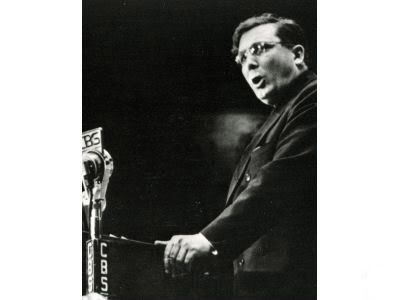
Consequently, the United States directly – and indirectly – supported colonial people who were demanding independence from their European masters. This greatly annoyed America’s allies, of course, but there was little they could do to shut America up. They did get a breather in October 1944 when Willkie died during a re-election campaign stop in Connecticut from a weak heart. His successor, Republican Secretary of State Arthur Vandenberg of Michigan, didn’t do much about the colonial issue while serving out the remainder of Willkie’s single term. When Dewey became the next elected President in January 1945, he toned down the anti-colonial rhetoric. However, even with Willkie gone, the damage had already been done. Once the war ended in early 1947, the demand from colonies for full independence accelerated. With Europe exhausted and unable to hold onto their empires effectively, the colonial system gradually broke down. Between 1947 and 1951, several (mostly British) colonies in Africa, the Middle East, and Asia became independent nations:
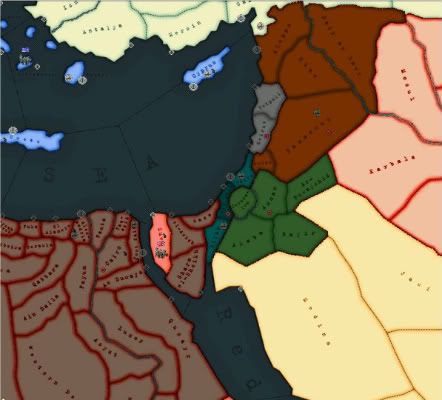
-Egypt (from the United Kingdom)
-Israel (from the United Kingdom)
-Jordan (from the United Kingdom)
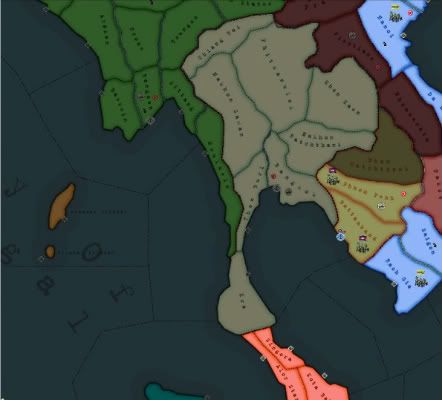
-Burma (from the United Kingdom)
-Cambodia (from France)
-Ceylon (from the United Kingdom)
-India (from the United Kingdom)
-Indonesia (from the Netherlands)
-Laos (from France)
-Pakistan (from the United Kingdom)
Tragically, Vietnam wasn’t among them.
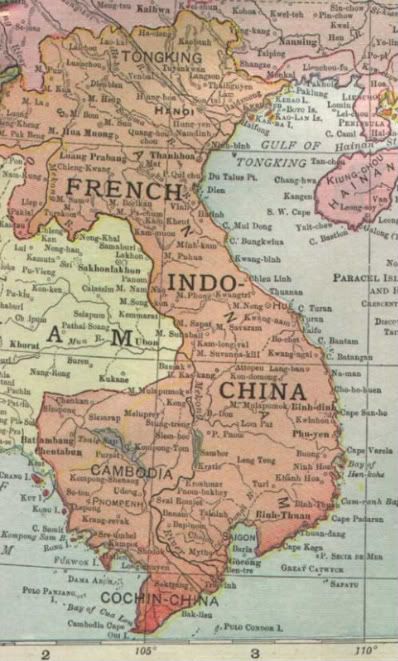
Since the late 19th Century, the French had been in control of Indochina (comprised of Cambodia, Laos, and Vietnam). Following the Second World War, the French attempted to re-exert their control over the region. However, as mentioned previously, they couldn’t hold onto Cambodia and Laos for very long. Soon, those two countries slipped from their grasp. Determined to have a foothold in Asia, the French government swore they would hold onto Vietnam no matter what. To make administering the colony easier, they established a puppet government there headed by Prince Bao Dai. Educated in France, Dai seemed like the perfect puppet ruler. What the French weren’t counting on was a man who had his own vision of postwar Vietnam…a vision that didn’t include the French.
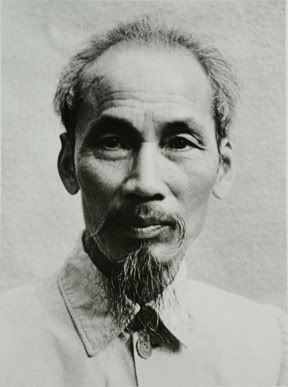
His name was Ho Chi Minh. A brilliant writer, Minh was a Communist who had been pestering France to get out of Vietnam for years. When Japan occupied Vietnam in 1940, Minh reacted by helping to form the Viet Minh, a national independence movement. The Viet Minh launched a guerilla campaign against the Japanese occupiers, harassing them at every turn.
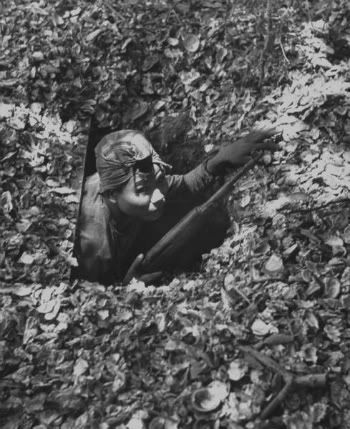
When the Japanese handed Vietnam back over to France at the end of the war, the Viet Minh naturally turned their guerilla warfare against the French. To provide an alternative to the Dai government, Minh organized his own government (called the Democratic Republic of Vietnam) in Hanoi. Of course, Paris wasn’t amused that these rebels were openly defying their rule. To put down the revolt, they dispatched military forces to Vietnam to reinforce Dai’s Vietnamese National Army. On April 23rd, 1948, the French Navy shelled Viet Minh positions in Haiphong. Under attack by superior forces, the Viet Minh withdrew from Haiphong.
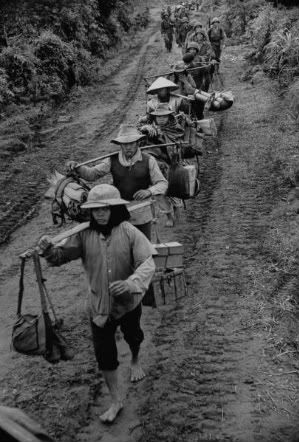
With those shots, the First Indochina War began. Having driven the rebels out, the French then turned their attention towards Hanoi. On May 19th, they attacked Minh’s capital. Again overwhelmed by superior firepower, Minh and his forces withdrew into the nearby jungle. Knowing that they couldn’t fight the French head-on, the Viet Minh stepped up their guerrilla campaign. Hit-and-run attacks became the norm, forcing French soldiers to be on guard at all times. Vo Nguyen Giap, Minh’s senior military leader, planned and led the long, wearing-down campaign against the enemy.
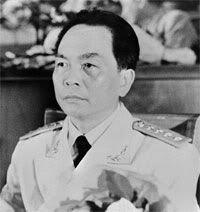
The First Indochina War soon resembled the American Revolution. Like the British, the French controlled the major cities of Vietnam. Like George Washington, Giap knew that the enemy was at a disadvantage once they moved outside the cities. The rice fields and jungles were the Viet Minh’s terrain, and they exploited the home field advantage to the fullest. To deal with the terrain disadvantage, the French built military installations called “hedgehogs” to operate out of. The purpose of the hedgehogs was to allow French soldiers and their allies to destroy Viet Minh supply lines and organizational efforts.
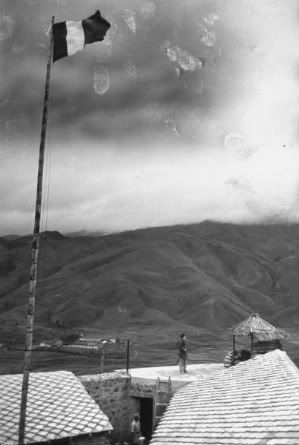
Hedgehogs, which seemed like a good idea on paper, turned out to be not very helpful. Far from weakening the Viet Minh, the bases gave them visible, stationary targets in which to launch guerilla attacks against. Furthermore, the hedgehogs were vulnerable to Vietnam’s rainy weather – particularly the Mekong Delta region in the South. Those unlucky enough to be stationed in that region were blanketed by incredible amounts of rainfall. That made calling in for artillery and air support virtually impossible. French soldiers were simply unprepared for the brutal weather, not to mention the various tropical diseases; as a result, their morale plummeted. Even something as simple as walking could knock them out of action.
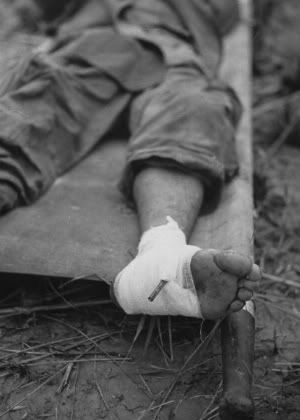
With their war in Vietnam dragging on with little to show for it, the French Government concluded in 1950 that they needed outside support…badly. Only one country, they felt, could make the difference between victory and defeat: the United States of America.
mad general: Thank you.
Wow. I am on the second page already and I have only done one update so far. I should probably fix that.
--------------------------------------------------------------------------
The First Indochina War
The postwar period witnessed the crumbling of the European colonial system. The old order, in which Europe dominated much of the world, was mortally undermined by the Second World War. Part of the reason has to do with the fact that the colonial system came under direct assault by the Axis Powers. Another reason for the crumbling was the staunch anti-colonial attitude of the newest superpower: the United States of America. Itself a product of the colonial system, America opposed propping up the empires of her allies in the name of defending freedom. When Republican President Wendell Willkie of Indiana (1941-1944) declared in his One World speech (delivered on July 4th, 1943) that “freedom is an indivisible word; if we want to enjoy it, we must be prepared to extend it to everyone,” he spoke on behalf of the nation.

Consequently, the United States directly – and indirectly – supported colonial people who were demanding independence from their European masters. This greatly annoyed America’s allies, of course, but there was little they could do to shut America up. They did get a breather in October 1944 when Willkie died during a re-election campaign stop in Connecticut from a weak heart. His successor, Republican Secretary of State Arthur Vandenberg of Michigan, didn’t do much about the colonial issue while serving out the remainder of Willkie’s single term. When Dewey became the next elected President in January 1945, he toned down the anti-colonial rhetoric. However, even with Willkie gone, the damage had already been done. Once the war ended in early 1947, the demand from colonies for full independence accelerated. With Europe exhausted and unable to hold onto their empires effectively, the colonial system gradually broke down. Between 1947 and 1951, several (mostly British) colonies in Africa, the Middle East, and Asia became independent nations:

-Egypt (from the United Kingdom)
-Israel (from the United Kingdom)
-Jordan (from the United Kingdom)

-Burma (from the United Kingdom)
-Cambodia (from France)
-Ceylon (from the United Kingdom)
-India (from the United Kingdom)
-Indonesia (from the Netherlands)
-Laos (from France)
-Pakistan (from the United Kingdom)
Tragically, Vietnam wasn’t among them.

Since the late 19th Century, the French had been in control of Indochina (comprised of Cambodia, Laos, and Vietnam). Following the Second World War, the French attempted to re-exert their control over the region. However, as mentioned previously, they couldn’t hold onto Cambodia and Laos for very long. Soon, those two countries slipped from their grasp. Determined to have a foothold in Asia, the French government swore they would hold onto Vietnam no matter what. To make administering the colony easier, they established a puppet government there headed by Prince Bao Dai. Educated in France, Dai seemed like the perfect puppet ruler. What the French weren’t counting on was a man who had his own vision of postwar Vietnam…a vision that didn’t include the French.

His name was Ho Chi Minh. A brilliant writer, Minh was a Communist who had been pestering France to get out of Vietnam for years. When Japan occupied Vietnam in 1940, Minh reacted by helping to form the Viet Minh, a national independence movement. The Viet Minh launched a guerilla campaign against the Japanese occupiers, harassing them at every turn.

When the Japanese handed Vietnam back over to France at the end of the war, the Viet Minh naturally turned their guerilla warfare against the French. To provide an alternative to the Dai government, Minh organized his own government (called the Democratic Republic of Vietnam) in Hanoi. Of course, Paris wasn’t amused that these rebels were openly defying their rule. To put down the revolt, they dispatched military forces to Vietnam to reinforce Dai’s Vietnamese National Army. On April 23rd, 1948, the French Navy shelled Viet Minh positions in Haiphong. Under attack by superior forces, the Viet Minh withdrew from Haiphong.

With those shots, the First Indochina War began. Having driven the rebels out, the French then turned their attention towards Hanoi. On May 19th, they attacked Minh’s capital. Again overwhelmed by superior firepower, Minh and his forces withdrew into the nearby jungle. Knowing that they couldn’t fight the French head-on, the Viet Minh stepped up their guerrilla campaign. Hit-and-run attacks became the norm, forcing French soldiers to be on guard at all times. Vo Nguyen Giap, Minh’s senior military leader, planned and led the long, wearing-down campaign against the enemy.

The First Indochina War soon resembled the American Revolution. Like the British, the French controlled the major cities of Vietnam. Like George Washington, Giap knew that the enemy was at a disadvantage once they moved outside the cities. The rice fields and jungles were the Viet Minh’s terrain, and they exploited the home field advantage to the fullest. To deal with the terrain disadvantage, the French built military installations called “hedgehogs” to operate out of. The purpose of the hedgehogs was to allow French soldiers and their allies to destroy Viet Minh supply lines and organizational efforts.

Hedgehogs, which seemed like a good idea on paper, turned out to be not very helpful. Far from weakening the Viet Minh, the bases gave them visible, stationary targets in which to launch guerilla attacks against. Furthermore, the hedgehogs were vulnerable to Vietnam’s rainy weather – particularly the Mekong Delta region in the South. Those unlucky enough to be stationed in that region were blanketed by incredible amounts of rainfall. That made calling in for artillery and air support virtually impossible. French soldiers were simply unprepared for the brutal weather, not to mention the various tropical diseases; as a result, their morale plummeted. Even something as simple as walking could knock them out of action.

With their war in Vietnam dragging on with little to show for it, the French Government concluded in 1950 that they needed outside support…badly. Only one country, they felt, could make the difference between victory and defeat: the United States of America.
Last edited:
List of things the US has to do:
1) Call Bell Helicopters.
2) Research into the possibility of fitting loudspeakers, missiles and guns to the products of above Company.
3) Issue surfboards to it's Cavalry Commanders.



1) Call Bell Helicopters.
2) Research into the possibility of fitting loudspeakers, missiles and guns to the products of above Company.
3) Issue surfboards to it's Cavalry Commanders.
First Cavalry qualitative decision-making process for local interactions:
1 - Is it 1941?
If YES, kill the horses, drink your urine, and do not at any costs cross river.
If NO, proceed to 2.
2 - Are you in Vietnam?
If YES, proceed to 5.
If NO, proceed to 3.
3 - Are you in Texas?
If YES, proceed to Iraq.
If NO, proceed to 4.
4 - Are you in Georgia?
If YES, proceed to Vietnam, continue from 5.
If NO, you are lost. Go back to 1.
5 - Are you in a helicopter?
If YES, proceed to 6.
If NO, enter helicopter and proceed to 6.
6 - Are there people around you?
If YES, proceed to 7.
If NO, land helicopter and find people. Proceed from 7.
7 - Do you recognize people?
If YES, go to 10.
If NO, go to 8.
8 - Do these people surf?
If YES, go to 10.
If NO, go to 9.
9 - Do you have napalm?
If YES, deploy napalm, continue to 10.
If NO, acquire napalm, deploy napalm, continue to 10.
10 - Are you surfing?
If YES - Terminate.
If NO - Surf, continue from 10.
1 - Is it 1941?
If YES, kill the horses, drink your urine, and do not at any costs cross river.
If NO, proceed to 2.
2 - Are you in Vietnam?
If YES, proceed to 5.
If NO, proceed to 3.
3 - Are you in Texas?
If YES, proceed to Iraq.
If NO, proceed to 4.
4 - Are you in Georgia?
If YES, proceed to Vietnam, continue from 5.
If NO, you are lost. Go back to 1.
5 - Are you in a helicopter?
If YES, proceed to 6.
If NO, enter helicopter and proceed to 6.
6 - Are there people around you?
If YES, proceed to 7.
If NO, land helicopter and find people. Proceed from 7.
7 - Do you recognize people?
If YES, go to 10.
If NO, go to 8.
8 - Do these people surf?
If YES, go to 10.
If NO, go to 9.
9 - Do you have napalm?
If YES, deploy napalm, continue to 10.
If NO, acquire napalm, deploy napalm, continue to 10.
10 - Are you surfing?
If YES - Terminate.
If NO - Surf, continue from 10.
Zeldar155: Of course America can! Heck, we beat the Axis Powers.
Of course, I haven't played the Vietnam mod yet, so who really knows.
trekaddict: :rofl:
c0d5579: :rofl:
volksmarschall: Where did this surfing talk come from?
By the way, TTL India is different from OTL India. This is why:
Of course, I haven't played the Vietnam mod yet, so who really knows.
trekaddict: :rofl:
c0d5579: :rofl:
volksmarschall: Where did this surfing talk come from?
By the way, TTL India is different from OTL India. This is why:
"In the fall of 1943, having broken through Allied defensive lines in Burma, the Japanese invaded India and wrestled the subcontinent away from the British. Tokyo soon learned what London had already known: controlling India is rather tricky. As they had elsewhere, the Japanese were brutal and repressive in their occupation of India. They were particularly tough on Indian nationalists. Whereas the British had responded to their calls for self-determination by throwing them in jail, the Japanese responded by killing them off. For instance, Mahatma Gandhi, known worldwide for his nonviolent resistance to British colonial rule, was beheaded by a Japanese officer. This, in turn, transformed Gandhi into a martyr.
The execution of Gandhi and the elimination of the pro-independence leadership turned out to be a bad decision for the Japanese (although there were those in London who privately were relieved that these 'headaches' had been removed). These killings only intensified the opposition of the Indian civilian population towards their new occupiers. Horrified by the atrocities and brutality the Japanese committed without a second thought (which made the previous British occupation seem kindhearted by comparison), partisan revolts broke out throughout India (except in Ceylon, an island off the Southeast coast of India which remained in British hands).
The partisan attacks tied down occupational forces, causing the Japanese advance westward to ground to a halt at Karachi. With the enemy stalled, the British and her Commonwealth allies took advantage of the situation to build up forces in Persia in order to take back India. In the summer of 1945, as a prelude to the American invasions of Japan and Korea, the Allies attacked Karachi. With manpower and supplies overextended, the Japanese defensive lines shattered like glass. With the United States Navy blockading the home islands, the Japanese lacked the reinforcements needed to check the Allied advance. Just as rapidly as the British Raj had collapsed two years earlier, the Japanese Raj too was quickly overwhelmed. The Allies raced across India, welcomed everywhere they went as liberators. By the beginning of October 1945, only a few pockets of Japanese resistance remained in Southern India. The rest of the Imperial Japanese Army had been driven back to the jungles of Burma – the frontline more-or-less returning to where it was in 1943. Although the Japanese occupation of India only lasted two years, it changed the subcontinent forever. It greatly strengthened the Indian movement towards independence and the need for collective security. With Gandhi and the other nationalists all killed off, landowners, native princes, and conservative pragmatists stepped forward to lead the subcontinent."
Last edited:
That reminds me, with the nutters dead TTL India will be a lot less communist and probably a lot more militaristic. What chance an Indian brigade going to Vietnam? Still fairly low I accept, but far higher than in OTL I'd say.
Nathan Madien Apocalypse Now.
El Pip The great Irony in AAO is that there it was Ghandi who talked the INC into supporting the Empire Act....
El Pip The great Irony in AAO is that there it was Ghandi who talked the INC into supporting the Empire Act....
Silly question. If Mao is not bordering uncle Ho, I wonder from where they are going to get supplies and equipment...
Interesting update, I wonder what a 1950s Vietnam will look like, and how will it affect Republicans in 1960?
El Pip: India is certainly a country the United States has her eyes on. There's a market for American goods to be tapped, after all. In Dewey's mind, any country that supports America's interests is a country worth supporting in return.
trekaddict: What does AAO mean?
Kurt_Steiner: I plan on talking about that in the update after this one.
mad general: 1960...I would like to see Nixon win. Whether or not he will get to that point is yet to be seen.
Then there's Barry Goldwater. He will be showing up soon, actually.
This update is a recap one. The purpose is to rehash what was going on in Dewey's second term while the First Indochina War was raging and why the French think they can get American support.
The next update will cover America's initial involvement in Vietnam and answer the question of how Ho Chi Minh will get Soviet and Red Chinese support with Kai-shek in the way.
The update after that will showcase the Cold War Tech mod. Then I will move onto the 1952 Presidential election and the beginning of Adlai Stevenson's Presidency.
Fun stuff ahead as we head into the 1950s.
--------------------------------------------------------------------------
Containing Communism
When the First Indochina War broke out in the spring of 1948, most Americans weren’t concerned about it. To them, it was nothing more than France trying to hold onto a colony. The Dewey Administration certainly didn’t plan to get involved in Southeast Asia. They had their eyes set on Europe instead.
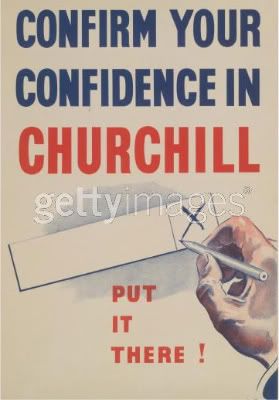
That July, while the United States geared up for a three-way Presidential race between Republican incumbent Dewey, Democratic candidate Richard Russell, Jr. of Georgia, and Progressive candidate Hubert Humphrey of Minnesota, the United Kingdom held her own national election. After eight years of having Churchill as Prime Minister, the British people spoke in a loud voice that it was time for a change. The ruling Conservative Party was defeated in a landslide that swept the Labour Party into power. Clement Attlee, the leader of Labour since October 1935, became the new Prime Minister.
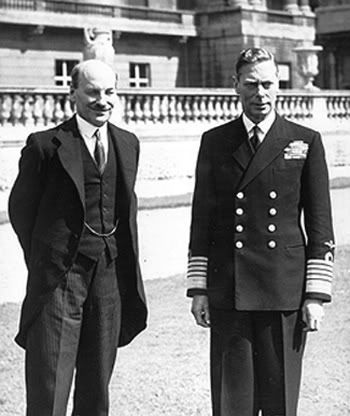
The new Head of His Majesty's Government wanted to establish a cradle-to-grave welfare state. In order to finance the project, Attlee slashed foreign spending – most notably pulling the plug on providing economic and military support for the anti-Communist governments of Yugoslavia, Albania, Greece, and Turkey. With the United Kingdom pulling out of Southern Europe, the United States moved decisively to plug the hole and prevent Communism from expanding further into the region. After rolling out the policy of fighting Communism by containing its’ growth, Dewey spent over $500 million dollars aiding the four aforementioned countries economically and militarily. Propping up Southern Europe would only be the beginning.
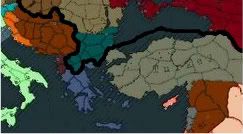
On November 2nd, while aid began to flow into Southern Europe, twenty-five million American voters returned Dewey to the White House for four more years. A major item on the President’s agenda for his second term was the escalation of Communist containment. Building upon the Southern Europe aid package, the Dewey Administration accelerated European postwar recovery by pouring thirteen billion dollars into the economies of Western and Central Europe. The aid increased industrial production by thirty percent, strengthened agricultural production, virtually abolished postwar poverty and starvation, increased standards of living, reinforced political stability, and greatly reduced Communist influence outside the Iron Curtain. In the process, Europe took a big step towards establishing what the President called “a Federal union”.
To counter Soviet influence in the Middle East, the United States gained a strategic position in the region by staunchly supporting the creation of a Jewish state. On February 14th, 1950, America became the first nation to formally recognize the State of Israel. Dewey then went a step further and rushed arms shipments to Israel to help the newborn nation successfully fend off her violent Arab neighbors. He then wheeled his attention towards the anti-Israeli State Department. Hating disagreements within his Administration, he purged dissents and quietly asked his highly-respected Secretary of State, George C. Marshall, to hand in his resignation. Marshall complied; not one to generate drama, the old General “officially” retired on the grounds of ill health. He was replaced by famed Southern poet Allen Tate, who would be nothing more than a simple “yes-man” that Dewey could boss around with impunity.
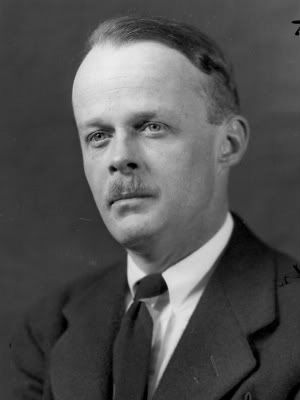
Of course, the United States wasn’t pouring billions of dollars into Europe and elsewhere just to be nice. Time and again, Dewey made it absolutely clear that there was a price nations had to pay in exchange for obtaining military and economic aid: full loyalty to the United States. To America, it was quite simple:
“We are doing everything in our power to make sure you don’t fall to Communism. All we want in return is your 100% backing of our interests. If you don’t like it, then don’t accept the aid. If you’re going to accept the aid, it is only fair that you support us.”
In early 1951, this loyalty demand manifested itself into a new military alliance led by the United States: the North Atlantic Treaty Organization (NATO for short). Belgium, Canada, Denmark, France, the Federal Republic of Germany, Italy, Luxembourg, the Netherlands, Norway, Portugal, and the United Kingdom all pledged to stand locked-step behind America in the event the Soviet Union went to war with her. For the President, NATO meant an additional layer of protection against the Communist threat. Moscow, it was hoped, would be deterred from being aggressive in the face of a united Democratic front.
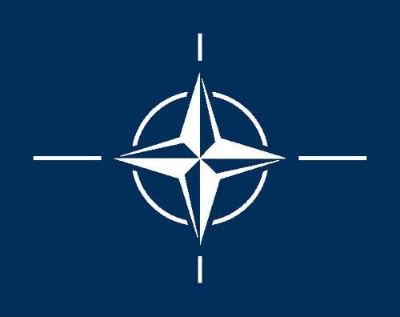
It is against this backdrop of Communist containment that the French Government decided in 1950 to appeal to the United States for support. They reasoned that if they dressed the Vietnamese quagmire up in the cloth of fighting Communism, then the Dewey Administration would feel obligated to intervene. Paris therefore decided to send a representative to the United States in late June to present their case.
--------------------------------------------------------------------------
On a side note, it still kills me that Paradox picked Allen Tate to be a Foreign Minister candidate. Seriously, where do they find these people?
trekaddict: What does AAO mean?
Kurt_Steiner: I plan on talking about that in the update after this one.
mad general: 1960...I would like to see Nixon win. Whether or not he will get to that point is yet to be seen.
Then there's Barry Goldwater. He will be showing up soon, actually.
This update is a recap one. The purpose is to rehash what was going on in Dewey's second term while the First Indochina War was raging and why the French think they can get American support.
The next update will cover America's initial involvement in Vietnam and answer the question of how Ho Chi Minh will get Soviet and Red Chinese support with Kai-shek in the way.
The update after that will showcase the Cold War Tech mod. Then I will move onto the 1952 Presidential election and the beginning of Adlai Stevenson's Presidency.
Fun stuff ahead as we head into the 1950s.
--------------------------------------------------------------------------
Containing Communism
When the First Indochina War broke out in the spring of 1948, most Americans weren’t concerned about it. To them, it was nothing more than France trying to hold onto a colony. The Dewey Administration certainly didn’t plan to get involved in Southeast Asia. They had their eyes set on Europe instead.

That July, while the United States geared up for a three-way Presidential race between Republican incumbent Dewey, Democratic candidate Richard Russell, Jr. of Georgia, and Progressive candidate Hubert Humphrey of Minnesota, the United Kingdom held her own national election. After eight years of having Churchill as Prime Minister, the British people spoke in a loud voice that it was time for a change. The ruling Conservative Party was defeated in a landslide that swept the Labour Party into power. Clement Attlee, the leader of Labour since October 1935, became the new Prime Minister.

The new Head of His Majesty's Government wanted to establish a cradle-to-grave welfare state. In order to finance the project, Attlee slashed foreign spending – most notably pulling the plug on providing economic and military support for the anti-Communist governments of Yugoslavia, Albania, Greece, and Turkey. With the United Kingdom pulling out of Southern Europe, the United States moved decisively to plug the hole and prevent Communism from expanding further into the region. After rolling out the policy of fighting Communism by containing its’ growth, Dewey spent over $500 million dollars aiding the four aforementioned countries economically and militarily. Propping up Southern Europe would only be the beginning.

On November 2nd, while aid began to flow into Southern Europe, twenty-five million American voters returned Dewey to the White House for four more years. A major item on the President’s agenda for his second term was the escalation of Communist containment. Building upon the Southern Europe aid package, the Dewey Administration accelerated European postwar recovery by pouring thirteen billion dollars into the economies of Western and Central Europe. The aid increased industrial production by thirty percent, strengthened agricultural production, virtually abolished postwar poverty and starvation, increased standards of living, reinforced political stability, and greatly reduced Communist influence outside the Iron Curtain. In the process, Europe took a big step towards establishing what the President called “a Federal union”.
To counter Soviet influence in the Middle East, the United States gained a strategic position in the region by staunchly supporting the creation of a Jewish state. On February 14th, 1950, America became the first nation to formally recognize the State of Israel. Dewey then went a step further and rushed arms shipments to Israel to help the newborn nation successfully fend off her violent Arab neighbors. He then wheeled his attention towards the anti-Israeli State Department. Hating disagreements within his Administration, he purged dissents and quietly asked his highly-respected Secretary of State, George C. Marshall, to hand in his resignation. Marshall complied; not one to generate drama, the old General “officially” retired on the grounds of ill health. He was replaced by famed Southern poet Allen Tate, who would be nothing more than a simple “yes-man” that Dewey could boss around with impunity.

Of course, the United States wasn’t pouring billions of dollars into Europe and elsewhere just to be nice. Time and again, Dewey made it absolutely clear that there was a price nations had to pay in exchange for obtaining military and economic aid: full loyalty to the United States. To America, it was quite simple:
“We are doing everything in our power to make sure you don’t fall to Communism. All we want in return is your 100% backing of our interests. If you don’t like it, then don’t accept the aid. If you’re going to accept the aid, it is only fair that you support us.”
In early 1951, this loyalty demand manifested itself into a new military alliance led by the United States: the North Atlantic Treaty Organization (NATO for short). Belgium, Canada, Denmark, France, the Federal Republic of Germany, Italy, Luxembourg, the Netherlands, Norway, Portugal, and the United Kingdom all pledged to stand locked-step behind America in the event the Soviet Union went to war with her. For the President, NATO meant an additional layer of protection against the Communist threat. Moscow, it was hoped, would be deterred from being aggressive in the face of a united Democratic front.

It is against this backdrop of Communist containment that the French Government decided in 1950 to appeal to the United States for support. They reasoned that if they dressed the Vietnamese quagmire up in the cloth of fighting Communism, then the Dewey Administration would feel obligated to intervene. Paris therefore decided to send a representative to the United States in late June to present their case.
--------------------------------------------------------------------------
On a side note, it still kills me that Paradox picked Allen Tate to be a Foreign Minister candidate. Seriously, where do they find these people?
On the plus side, Marshall's rather debilitating mission to China never happens. On the minus side, Marshall gets sold down the river in both timelines. Still, it's a more dignified dismissal than Francis Gary Powers, at the hands of your onetime subordinate...
Sound interesting. I wonder what my country like in the mod  . After all Vietnam is a harsh and cruel land for the invader
. After all Vietnam is a harsh and cruel land for the invader  . Hope there are more creation here.
. Hope there are more creation here.
PS: There are no AAR for Vietnam here (exactly there are a republic of Vietnam AAR not Democratic Republic of Vietnam AAR) . Hope i have sometime to write my own Vietnam AAR (in Vietnam mod).
. Hope i have sometime to write my own Vietnam AAR (in Vietnam mod).
PS: There are no AAR for Vietnam here (exactly there are a republic of Vietnam AAR not Democratic Republic of Vietnam AAR)
Last edited:
Eeeww! NATO! Look out! 
Shall Europe and America be in tighter military relations in this timeline? Just picture the French Foreign Legion fighting with Air Cavalry!
Shall Europe and America be in tighter military relations in this timeline? Just picture the French Foreign Legion fighting with Air Cavalry!
Also, can you include a British transfer of Sabah to the Philippines around 1958 and the honorary inclusion of the Philippines into NATO in 1960?
I wouldn't be surprised if it show in-game that much of western Europe was a puppet of the United States.
Also, can you include a British transfer of Sabah to the Philippines around 1958 and the honorary inclusion of the Philippines into NATO in 1960?
I suppose SEATO would probably be led by the Philippines; and that we'd get two Malayan states, one Peninsular and the other possibly an enlarged Brunei. With that said, the northern chunk of Sabah is likely to be handed to the Philippines under US pressure I think.

